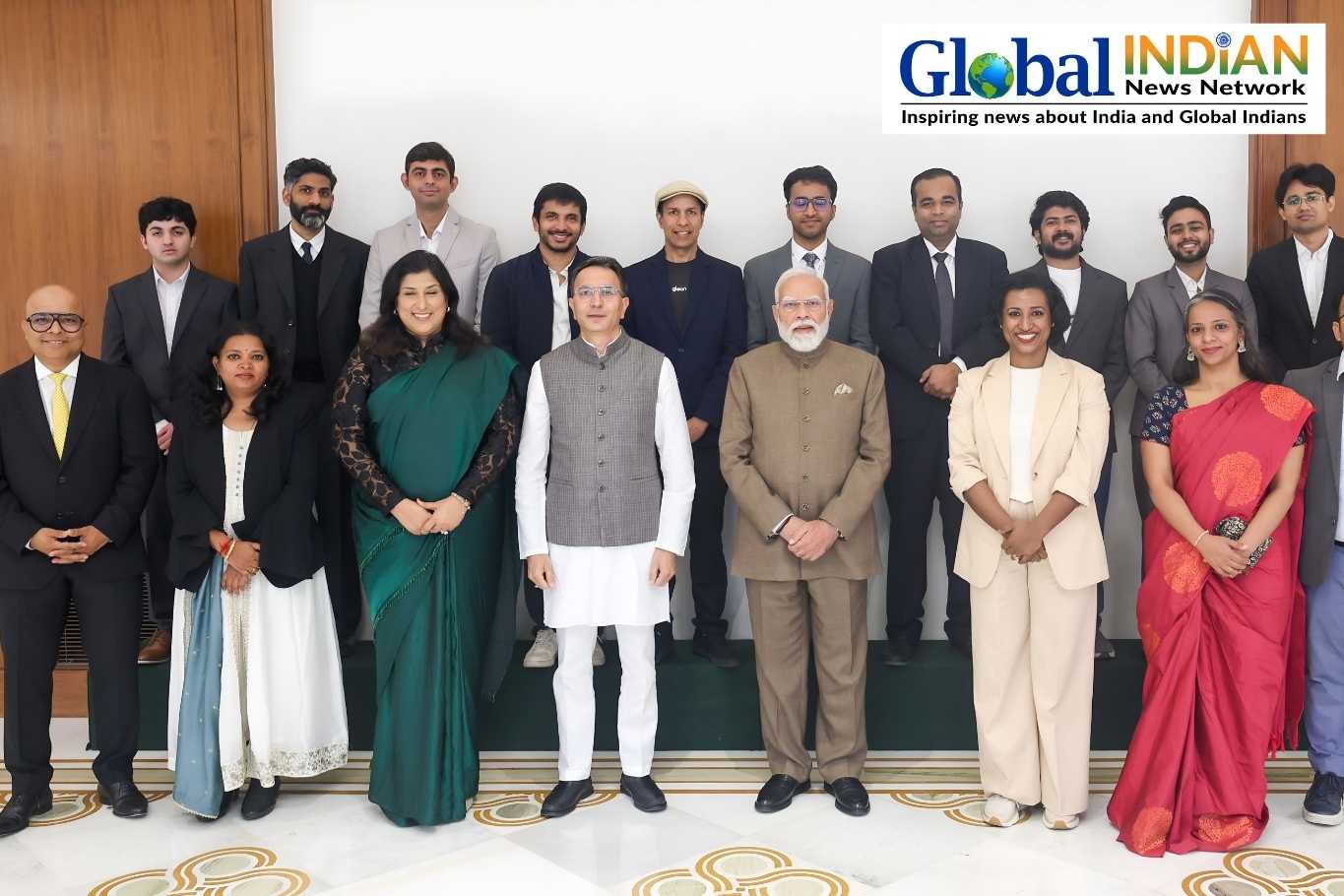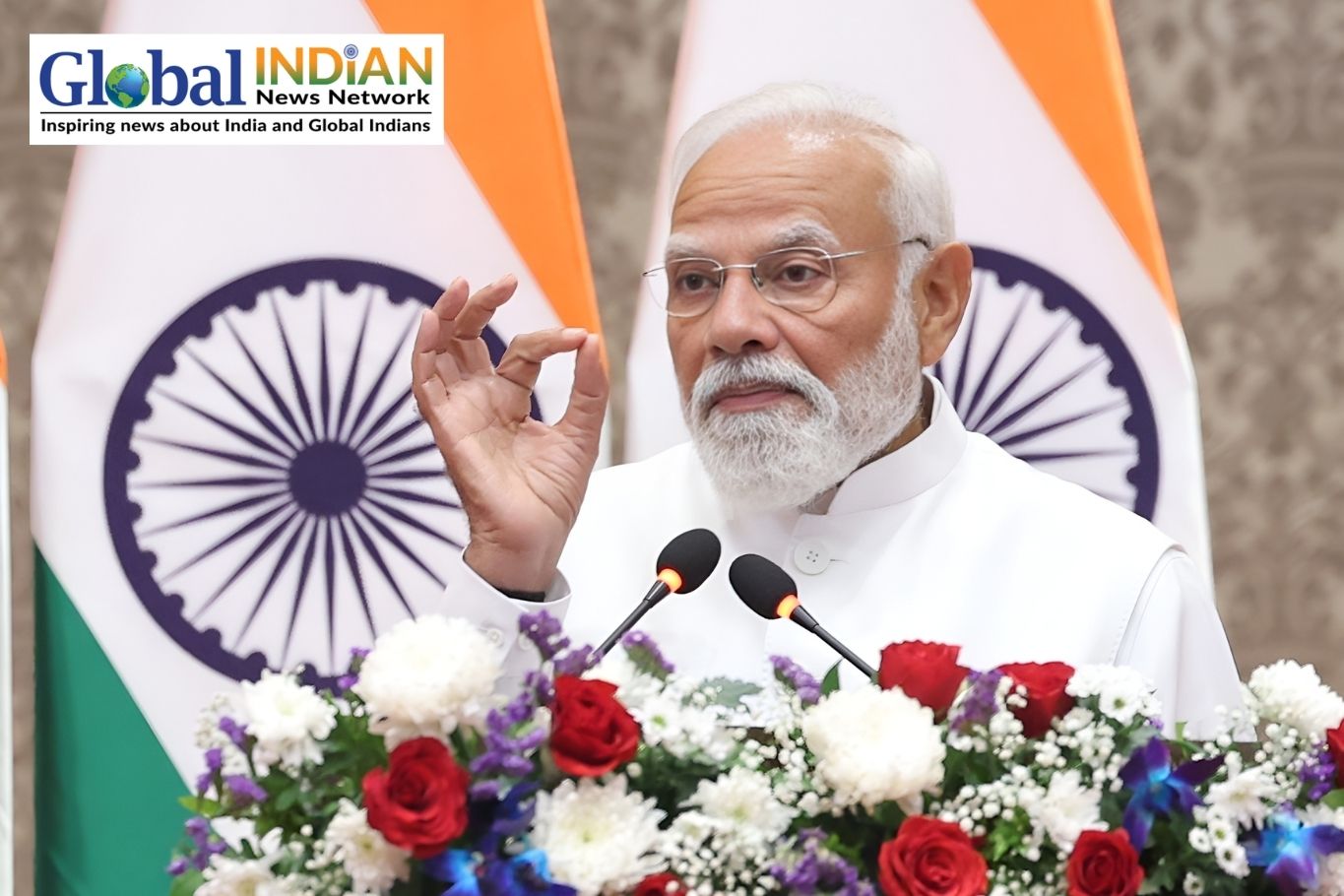By Sabrina Liyaquat
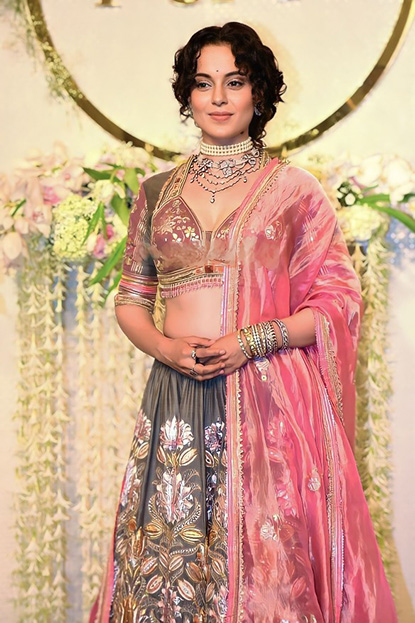 Indian Bollywood actress Kangana Ranaut is a name that evokes a sense of power, talent, and controversy in the Indian film industry. From her humble beginnings to challenging the Bollywood establishment, Kangana has carved a niche for herself with her stellar performances and bold statements. Her journey is nothing short of inspirational, as she has faced numerous challenges and controversies along the way. Let us look into the life and career of Kangana Ranaut, highlighting her successes, struggles, and the impact she has had not only in the Bollywood industry but now in the public domain.
Indian Bollywood actress Kangana Ranaut is a name that evokes a sense of power, talent, and controversy in the Indian film industry. From her humble beginnings to challenging the Bollywood establishment, Kangana has carved a niche for herself with her stellar performances and bold statements. Her journey is nothing short of inspirational, as she has faced numerous challenges and controversies along the way. Let us look into the life and career of Kangana Ranaut, highlighting her successes, struggles, and the impact she has had not only in the Bollywood industry but now in the public domain.
The Humble Beginnings
The picturesque backdrop of a small town in Himachal Pradesh, far removed from the glitz and glamor of Bollywood, set the stage for Kangana Ranaut’s early life. Dreaming bigger than her surroundings, Kangana harbored aspirations that seemed distant for many in her town. With ambition in her heart, she relocated to Mumbai, the city that houses the dreams of countless aspiring actors. This transition marked the start of a challenging journey filled with setbacks and rejections that would test her resolve. Mumbai, known for its competitive nature, especially in the film industry, offered no easy path for newcomers. Despite the obstacles, Kangana’s unwavering determination and unique talent eventually captured the attention of filmmakers.
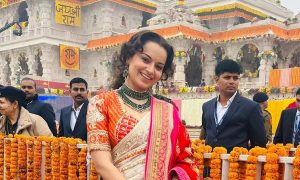 At the age of sixteen, Ranaut briefly pursued a career in modeling before undergoing training with theater director Arvind Gaur. She made her cinematic debut in the 2006 thriller “Gangster,” for which she received the Filmfare Award for Best Female Debut. She garnered acclaim for her portrayal of emotionally charged characters in the dramas “Woh Lamhe…” (2006), “Life in a… Metro” (2007), and “Fashion” (2008). For her performance in “Fashion,” she earned the National Film Award for Best Supporting Actress. The commercially successful films “Raaz: The Mystery Continues” (2009) and “Once Upon a Time in Mumbaai” (2010) featured her, despite criticism for her tendency to play neurotic roles. “Tanu Weds Manu” (2011) received positive feedback for her comedic performance. Her breakthrough roles were a testament to her acting ability and resilience, proving that talent could indeed pave the way for success in the demanding world of Bollywood.
At the age of sixteen, Ranaut briefly pursued a career in modeling before undergoing training with theater director Arvind Gaur. She made her cinematic debut in the 2006 thriller “Gangster,” for which she received the Filmfare Award for Best Female Debut. She garnered acclaim for her portrayal of emotionally charged characters in the dramas “Woh Lamhe…” (2006), “Life in a… Metro” (2007), and “Fashion” (2008). For her performance in “Fashion,” she earned the National Film Award for Best Supporting Actress. The commercially successful films “Raaz: The Mystery Continues” (2009) and “Once Upon a Time in Mumbaai” (2010) featured her, despite criticism for her tendency to play neurotic roles. “Tanu Weds Manu” (2011) received positive feedback for her comedic performance. Her breakthrough roles were a testament to her acting ability and resilience, proving that talent could indeed pave the way for success in the demanding world of Bollywood.
Challenging the Bollywood establishment
 Kangana Ranaut’s relationship with the Bollywood establishment has been anything but conventional. Her refusal to conform to industry norms and her outspoken critique of its deeply entrenched nepotism have set her apart as a maverick. She has openly criticized the industry’s gatekeepers for favoring those with familial connections over talent, sparking widespread debate and bringing attention to the barriers faced by outsiders. This bold stance has made her a subject of contention, drawing criticism from some quarters while earning her a legion of supporters who admire her tenacity and integrity. Kangana’s relentless pursuit of fairness and her call for meritocracy in Bollywood have not only highlighted her as an advocate for change, but also as an individual willing to risk her standing for her principles. Her actions have encouraged others in the industry to voice their own experiences with nepotism, gradually shifting the conversation towards greater inclusivity and transparency. Despite the pushback, Kangana’s fearless approach and commitment to challenging the status quo continue to disrupt the traditional dynamics of Bollywood, showcasing her as a trailblazer unafraid to stand alone against the established norms.
Kangana Ranaut’s relationship with the Bollywood establishment has been anything but conventional. Her refusal to conform to industry norms and her outspoken critique of its deeply entrenched nepotism have set her apart as a maverick. She has openly criticized the industry’s gatekeepers for favoring those with familial connections over talent, sparking widespread debate and bringing attention to the barriers faced by outsiders. This bold stance has made her a subject of contention, drawing criticism from some quarters while earning her a legion of supporters who admire her tenacity and integrity. Kangana’s relentless pursuit of fairness and her call for meritocracy in Bollywood have not only highlighted her as an advocate for change, but also as an individual willing to risk her standing for her principles. Her actions have encouraged others in the industry to voice their own experiences with nepotism, gradually shifting the conversation towards greater inclusivity and transparency. Despite the pushback, Kangana’s fearless approach and commitment to challenging the status quo continue to disrupt the traditional dynamics of Bollywood, showcasing her as a trailblazer unafraid to stand alone against the established norms.
Kangana’s award-winning performances
Kangana Ranaut’s filmography is a testament to her unparalleled talent and ability to immerse herself completely in the characters she portrays. A series of performances marked her journey through Bollywood, challenging her as an actress and leaving an indelible mark on the audience. One of the most notable milestones in her career came with her role in “Fashion,” where her portrayal of a troubled model garnered her critical acclaim and a National Film Award, setting a precedent for her future in the industry.
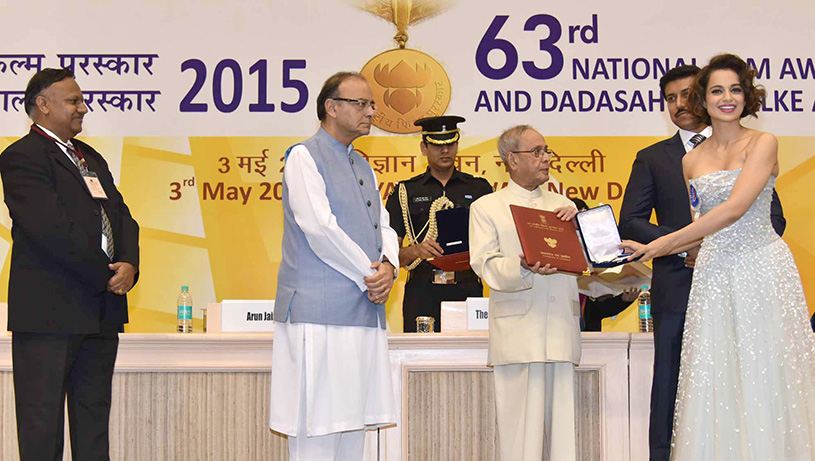
However, her role as a naive young woman embarking on a solo honeymoon trip after her fiancé’s departure in the film “Queen” truly catapulted Kangana into the limelight. This performance showcased Kangana’s exceptional range and earned her numerous awards, including another National Film Award. Her ability to bring depth and authenticity to her roles has made her a favorite among both audiences and critics.
Further cementing her status in Bollywood were her performances in “Tanu Weds Manu” and its sequel, where her dual roles displayed her versatility and comedic timing, earning her additional acclaim and awards. Each role Kangana has undertaken is a narrative of her defiance against typecasting, proving her mettle and solidifying her place as a formidable force in the Indian film industry.
Venturing into Directing and Production
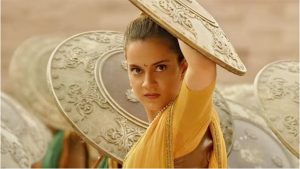 Expanding her horizons beyond acting, Kangana Ranaut took a bold step into directing and producing, further showcasing her diverse talents. Positive reception met her directorial debut, “Manikarnika: The Queen of Jhansi,” where she also played the lead role, highlighting her capability to helm a large-scale historical project. This move was not just about personal growth but also about challenging the industry’s status quo, demonstrating that actresses can successfully navigate roles traditionally dominated by men. By stepping into production, Kangana has also sought to create more opportunities for stories that resonate with her vision, emphasizing the importance of female-led narratives in cinema. This venture into directing and producing underscores her commitment to influencing the film industry from multiple angles, advocating for creative freedom and broader representation. Her transition from in front of the camera to behind it exemplifies her relentless pursuit of innovation and excellence, reinforcing her impact on Bollywood’s evolving landscape.
Expanding her horizons beyond acting, Kangana Ranaut took a bold step into directing and producing, further showcasing her diverse talents. Positive reception met her directorial debut, “Manikarnika: The Queen of Jhansi,” where she also played the lead role, highlighting her capability to helm a large-scale historical project. This move was not just about personal growth but also about challenging the industry’s status quo, demonstrating that actresses can successfully navigate roles traditionally dominated by men. By stepping into production, Kangana has also sought to create more opportunities for stories that resonate with her vision, emphasizing the importance of female-led narratives in cinema. This venture into directing and producing underscores her commitment to influencing the film industry from multiple angles, advocating for creative freedom and broader representation. Her transition from in front of the camera to behind it exemplifies her relentless pursuit of innovation and excellence, reinforcing her impact on Bollywood’s evolving landscape.
A New Chapter
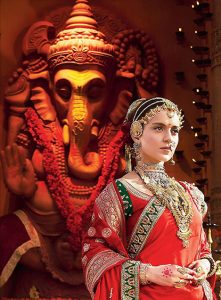 Kangana Ranaut recently marked a new chapter in her life by visiting the Ram Lala Temple, followed by entering politics. The visit is not just a personal spiritual journey but also a significant step towards her anticipated entry into politics. Often voicing her opinions on various national issues, Ranaut’s alignment with cultural and religious symbolism resonates deeply with a large section of India’s population.
Kangana Ranaut recently marked a new chapter in her life by visiting the Ram Lala Temple, followed by entering politics. The visit is not just a personal spiritual journey but also a significant step towards her anticipated entry into politics. Often voicing her opinions on various national issues, Ranaut’s alignment with cultural and religious symbolism resonates deeply with a large section of India’s population.
At the Ram Mandir inauguration, Bollywood actress Kangana Ranaut expressed her awe for the historic event. On Instagram, she shared images of herself at the 50-meter shrine dedicated to Lord Ram Lalla, captioned with reverence for the site as the birthplace of Shri Ram. Drawing comparisons with Vatican City, Kangana anticipated that the Ram Temple would gain global reverence, surpassing even the iconic religious site in spiritual significance.
In her interactions with the media, she praised the leadership of Prime Minister Narendra Modi and Uttar Pradesh Chief Minister Yogi Adityanath, predicting Ayodhya’s rising prominence.
“Devotees who seek darshan at the Ram temple will earn a lot of virtue. We are fortunate that Lord Ram has given us the wisdom to come and worship him here. We will re-establish Ram Rajya here,” she said.
Kangana compared the ceremony’s nostalgic and sacred atmosphere to a journey back in time, reminiscent of the narratives of Puranic tales. She also highlighted the significant developmental changes under Chief Minister Yogi Adityanath’s governance, crediting his administration with transformative progress in Uttar Pradesh.
Political Aspirations
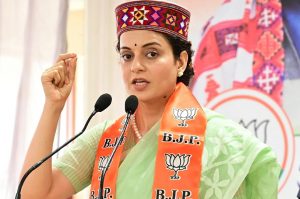 Kangana Ranaut’s life has completed a full circle. She has joined the political arena both on and off screen, having previously portrayed prominent politicians like Jayalalitha. The Bollywood star will run for the Bharatiya Janata Party (BJP) in the Lok Sabha elections from the Mandi district in Himachal Pradesh. The BJP announced Ranaut’s candidature, reflecting her long-standing support for the party and her strong nationalistic sentiments and outspoken political views.
Kangana Ranaut’s life has completed a full circle. She has joined the political arena both on and off screen, having previously portrayed prominent politicians like Jayalalitha. The Bollywood star will run for the Bharatiya Janata Party (BJP) in the Lok Sabha elections from the Mandi district in Himachal Pradesh. The BJP announced Ranaut’s candidature, reflecting her long-standing support for the party and her strong nationalistic sentiments and outspoken political views.
She recently spoke with the media, expressing her commitment to serve if elected and sharing her emotional connection to Mandi, her birthplace. “This is my ‘janmabhoomi’, and it has called me back. I am fortunate… If they choose me, I will serve them. I am overwhelmed,” Ranaut stated during the celebrations.
Ranaut further solidified her engagement with the BJP by taking to Instagram to express her gratitude and honor at her nomination, pledging to be a diligent worker and servant to the public. “My beloved Bharat and Bhartiya Janta’s party, the Bharatiya Janata Party (BJP), has always had my unconditional support. I feel honored and elated to officially join the party,” she wrote.
Additionally, Ranaut is preparing for her upcoming film, ‘Emergency,’ where she will play the late Prime Minister Indira Gandhi. This project also marks her return to directing, following her last directorial effort in 2019 with ‘Manikarnika’. This move to blend her cinematic and political careers shows a full-circle moment for Ranaut, embodying both her artistic and political aspirations.
A beacon of empowerment
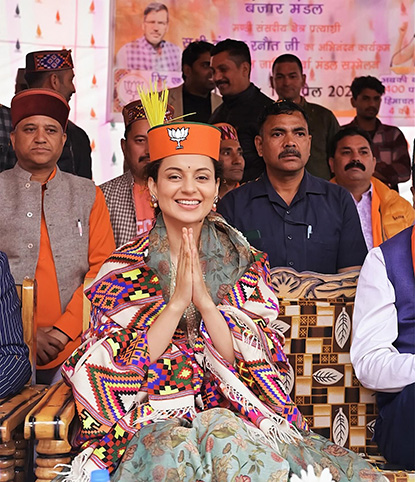 The narrative of Kangana Ranaut reflects an extraordinary blend of sheer will, indomitable spirit, and the audacity to confront entrenched norms. Her trajectory within Bollywood and her foray into the political arena encapsulate a journey that is both inspiring and polarizing. Kangana, through her actions and outspoken nature, has become a symbol of defiance against conventional wisdom and societal expectations.
The narrative of Kangana Ranaut reflects an extraordinary blend of sheer will, indomitable spirit, and the audacity to confront entrenched norms. Her trajectory within Bollywood and her foray into the political arena encapsulate a journey that is both inspiring and polarizing. Kangana, through her actions and outspoken nature, has become a symbol of defiance against conventional wisdom and societal expectations.
To many, she represents a beacon of empowerment, unafraid to challenge the patriarchal norms of Bollywood and society. People view her journey as a symbol of resilience, drawing inspiration from her victories against industry biases and typecasting.
Her journey has not been without obstacles; instead, it has been characterized by her capacity to overcome obstacles and utilize her platform to initiate discussions on crucial matters. Kangana’s contributions to Indian cinema go beyond her award-winning performances. She has reshaped the conversation around nepotism, championed the cause of women in film, and ventured into areas previously unexplored by many of her peers. Her directorial and production efforts have broken new ground, demonstrating a commitment to storytelling that elevates and empowers. As she navigates the complexities of political life, her resolve to instigate change remains unwavering. Kangana Ranaut’s legacy is multifaceted, embodying the spirit of resilience and transformation. Her journey invites reflection on the power of individual agency to challenge the status quo and enact meaningful change. Kangana’s imprint on Bollywood and her emerging role in Indian politics are a testament to her unparalleled influence and enduring impact on India’s cultural and social fabric.
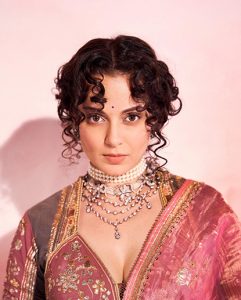 However, it was the film “Queen” that truly catapulted Kangana into the limelight, with her role as a naive young woman who embarks on a solo honeymoon trip after being left by her fiancé. This performance showcased Kangana’s exceptional range and earned her numerous awards, including another National Film Award. Her ability to bring depth and authenticity to her roles has made her a favorite among both audiences and critics.
However, it was the film “Queen” that truly catapulted Kangana into the limelight, with her role as a naive young woman who embarks on a solo honeymoon trip after being left by her fiancé. This performance showcased Kangana’s exceptional range and earned her numerous awards, including another National Film Award. Her ability to bring depth and authenticity to her roles has made her a favorite among both audiences and critics.
Further cementing her status in Bollywood were her performances in “Tanu Weds Manu” and its sequel, where her dual roles displayed her versatility and comedic timing, earning her additional acclaim and awards. Each role Kangana has undertaken is a narrative of her defiance against typecasting, proving her mettle and solidifying her place as a formidable force in the Indian film industry.
About the Author
Sabrina Liyaquat is a journalist in India, renowned for her pro-Modi stance and insightful coverage of the Prime Minister’s initiatives for the Muslim community. Holding a degree in Mass Communication, Sabrina has dedicated her career to highlighting the positive impacts of Narendra Modi’s policies on Muslims in India. Through her writings, she explores and promotes the government’s efforts in enhancing economic opportunities, educational advancements, and social integration for Muslims. Her work not only educates but also fosters a sense of unity and progress, earning her a respected position and numerous accolades in the realm of Indian journalism


